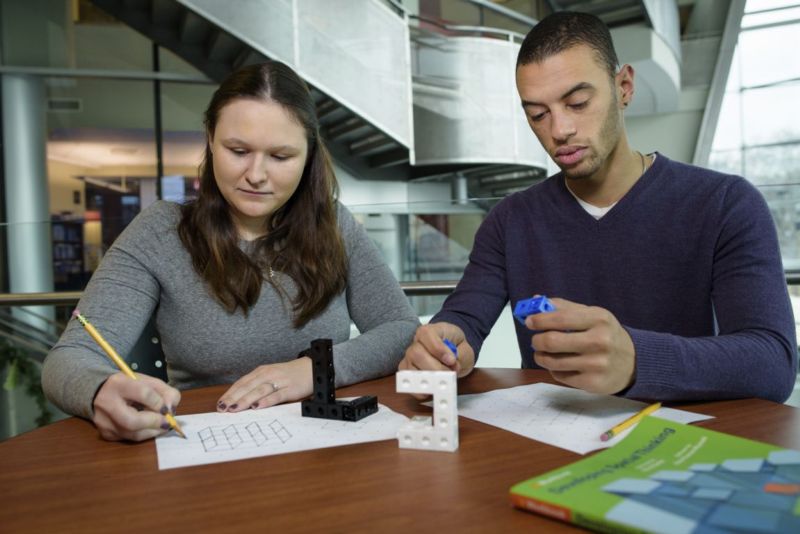
Students practice spatial skills using sketching exercises and snap cubes from the Developing Spatial Thinking curriculum.
Students use the iPad app SpatialVizfor sketching exercises to develop spatial skills.
This project brings together a team of community and technical college faculty and administrators, curriculum developers, and evaluators in an effort to adapt and implement instruction that develops and enhances students' spatial skills. The curriculum materials and instructional strategies are being adapted to an online environment for students in technician programs in advanced technology fields in science, technology, engineering, and mathematics (STEM). The project team examines how student demographics and student performance on a test that assesses mental rotation are related to student success in introductory courses that require spatial ability.

The National Science Foundation's Advanced Technological Education (ATE) program has been funding innovation at two-year colleges for over twenty years. With a focus on the education of technicians for the high-technology fields that drive our nation's economy, and strong partnerships between academic institutions and industry, ATE promotes improvement in the education of science and engineering technicians at the undergraduate and secondary school levels.
To learn more about ATE, please visit the NSF ATE program home page.
To improve community college students' spatial visualization skills, which researchers have identified as critical to success in STEM courses, the Adapting Tested Spatial Skills Curriculum to On-Line Format for Community College Instruction: A Critical Link to Retain Technology Students project modified the ten-module Developing Spatial Thinking curriculum for use online. Four community colleges delivered the course; two also used the project's iPad drawing app.
The scores of the 175 students who completed the spatial visualization modules on the Purdue Spatial Visualization Test: Rotations were significantly higher after completing the course than prior to the course.
Most importantly, students who completed the modules earned higher grades in technical education courses than students who were eligible but did not take the training.

The Adapting Tested Spatial Skills Curriculum to On-Line Format for Community College Instruction: A Critical Link to Retain Technology Students project is based at Stevens Institute of Technology. Stevens Institute of Technology, founded in 1870, is a private research university located in Hoboken, New Jersey. The university has three schools and one college, 6,600 undergraduate and graduate students, and offers a range of academic and research programming that includes business, computing, the arts, and more.
Ruani Ribe
Primary Contact
Email: [email protected]
Susan Metz
Principal Investigator
Email: [email protected]